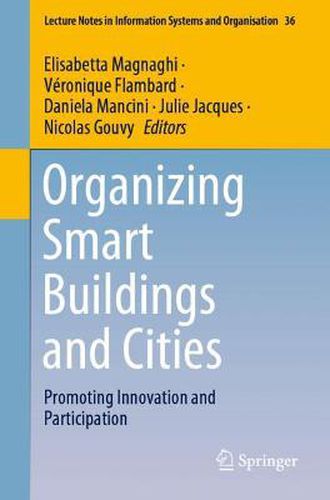Readings Newsletter
Become a Readings Member to make your shopping experience even easier.
Sign in or sign up for free!
You’re not far away from qualifying for FREE standard shipping within Australia
You’ve qualified for FREE standard shipping within Australia
The cart is loading…






This title is printed to order. This book may have been self-published. If so, we cannot guarantee the quality of the content. In the main most books will have gone through the editing process however some may not. We therefore suggest that you be aware of this before ordering this book. If in doubt check either the author or publisher’s details as we are unable to accept any returns unless they are faulty. Please contact us if you have any questions.
The United Nations included sustainable cities and communities in its 2030 SDGs. Cities and, on a smaller scale, neighborhoods, building managers and firms are now adopting technologies and information systems to help achieve the energy, economic, social and environmental transition. This volume gathers contributions on the key organizational success factors for this transition.
To do so, it analyzes the role of information systems, use of data, and technological assistance solutions from multiple perspectives. The goal is to develop a framework that can successfully apply information systems to organizational and environmental issues for smart cities and smart buildings. Accordingly, the book addresses living-lab experiment evaluation techniques, and provides critical analyses of the role of the environment, context and users’ behavioral responses. In addition, it discusses key questions on the efficient management of resources, need for appropriate IT solutions, and employing co-creation with users to improve planning and organization.
$9.00 standard shipping within Australia
FREE standard shipping within Australia for orders over $100.00
Express & International shipping calculated at checkout
This title is printed to order. This book may have been self-published. If so, we cannot guarantee the quality of the content. In the main most books will have gone through the editing process however some may not. We therefore suggest that you be aware of this before ordering this book. If in doubt check either the author or publisher’s details as we are unable to accept any returns unless they are faulty. Please contact us if you have any questions.
The United Nations included sustainable cities and communities in its 2030 SDGs. Cities and, on a smaller scale, neighborhoods, building managers and firms are now adopting technologies and information systems to help achieve the energy, economic, social and environmental transition. This volume gathers contributions on the key organizational success factors for this transition.
To do so, it analyzes the role of information systems, use of data, and technological assistance solutions from multiple perspectives. The goal is to develop a framework that can successfully apply information systems to organizational and environmental issues for smart cities and smart buildings. Accordingly, the book addresses living-lab experiment evaluation techniques, and provides critical analyses of the role of the environment, context and users’ behavioral responses. In addition, it discusses key questions on the efficient management of resources, need for appropriate IT solutions, and employing co-creation with users to improve planning and organization.